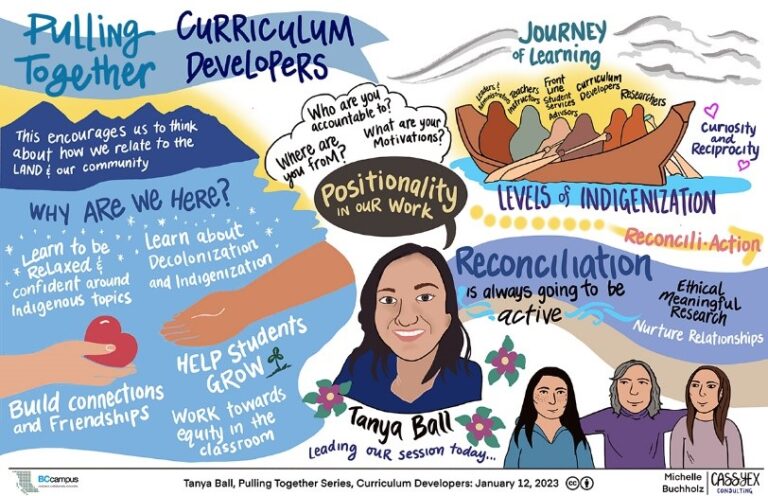Faculty Spotlight: Amanda Bickell
Amanda Bickell is the Program Chair of the Bachelor of Business Administration (BBA) in Entrepreneurial Leadership program at KPU. For this edition of our Faculty Spotlight, Amanda joins us in a conversation about her entrepreneurial spirit, her role as a learning coach in the classroom, and creating spaces for failure.
“The one thing I show almost every class is a video of a baby learning to walk,” Amanda tells us during our conversation. She sends us a link to the video over the chat.
The video is exactly as described on the tin. It’s a montage that condenses one full month into a blink of an eye; in two minutes, we witness a baby take his first steps and slowly gain confidence with each step, stumble, and stagger. Time and time again, the baby pushes himself to teetering feet. Within a few seconds, he topples over – and without fail, his face squeezes into a joyous smile, and he tries again. And again. And again.
Sometimes, we catch glimpses of a parent with hovering hands, mirroring his bright smile onto their own faces, ready to catch him at any given moment. When he stands, they celebrate. When he falls, they still celebrate. Each effort is momentous and triumphant. And it’s the cumulation of all these falls and failures that build and build over time until we witness the baby finally take his first full steps at 11 months old.
“I challenge everybody to think of when they were that happy to fail,” Amanda says. “When did you embrace it so genuinely, and with so much enthusiasm to get up and try again?”
Amanda Bickell is no stranger to failure.
Born and raised in southwestern Ontario, she moved with her family throughout the province until she was nine years old, when her father settled in Stratford and opened his own grocery store. Mr. Grocer was an independent grocery store that belonged to the National Grocers Conglomerate, and is where Amanda and her younger brother spent most of their childhood.
After most school days, Amanda and her brother would find themselves in Mr. Grocer and busy themselves with everything from the menial tasks of counting coins, tidying up, to playing together in the backroom. On Sundays when all businesses were closed, they would ride their bikes in the store, weave around on roller skates, and play laser tag with the lights turned off. Their fondest memories took place between the aisles.
Eventually, both Amanda and her brother graduated into officially working for the family business. To Amanda, this was a natural progression.
“The business was the whole family,” she tells us. She says this with certainty, and with a lightness associated with recalling one’s best memories.
As with any business, however, not all days can boast sunshine and clear skies. There were challenges too. Amanda alludes to them in our conversation. “Your family’s livelihood is on the line,” she explains. There’s a lot at stake to run a business, especially a family business. “When something happens, you have to adapt quickly, you have to think about all of the people that are involved, and who it’s going to impact.”
You encounter failures before you encounter success. In fact, there may always be more failures than success. Yet it is from the experiential learning attained with her family business and from challenging failure, that Amanda found her passion for entrepreneurial leadership. The grocery store showed Amanda the benefits and challenges of having an entrepreneurial spirit, and what it takes to keep going, and to make it successful.
Amanda didn’t so much as walk away from her family’s grocery store, as she walked forward with the lessons learned as forever a part of her.
As an instructor for Entrepreneurial Leadership at KPU, Amanda describes her role in the classroom as “a coach.” Her definition of a coach is derived directly from her experiences with business while growing up; it means developing a team, meeting their needs, and lifting one another up as a leader. Ever since she started teaching 20 years ago, she has always embodied this approach in the classroom.
She paints a stark contrast from the conventional pedagogical models. Rather than standing at the front of a classroom – as the “sage on the stage,” she describes it – and delivering information through lectures for the sake of standardized examinations, Amanda wants to focus on how she can empower students in academia and beyond.
And where does empowerment stem from? “Helping them through failure,” Amanda explains. “Setting the stage for exploration that will motivate students. To take the journey, to do the work, to feel the suck of failure, and to say ‘oh well, we’ll try again,’ and to get excited to try again.”

Amanda breaks this approach down further for us with a helpful example. Currently, she teaches a course where students develop business-making skills. It can be a challenging course, and it requires a deeper understanding of information that students learned previously at introductory levels (business, marketing, operations, etc.) in order to problem-solve the case studies presented in the course.
What Amanda tries to do differently is implement mechanisms that allow students to overcome roadblocks with her guidance. Students are encouraged to revisit course assignments and to complete them for escalating marks, all of which are designed to incentivize students to fix mistakes, to grow, to learn, to succeed.
As she wraps up her tenure as the Program Chair of the Entrepreneurial Leadership (ENTR) program, Amanda also looks towards a new project on the horizon. In order to motivate her students, Amanda hopes to gamify this same course. Gamification is the use of game design elements in education to enhance learning and participation for students (a popular example can be seen in Duolingo, the language-learning website).
“In a video game, you have to get good enough to pass level one,” says Amanda. “But in a traditional class, if you don’t get it at level one, then the whole class moves to level two. You are just left behind.”
In a standard course structure, classrooms are founded on the binaric oppositions of pass or failure – and regardless of your individual outcome, the class continues to progress. While there are merits and reasonable rationale for this structure, particularly as it creates timelines, expectations, progression goals that can be more sustainable for both instructors and students to follow, it also poses a risk of leaving students behind before they have the opportunity to truly learn.
As she plans the course re-design, Amanda hopes to personalize the course material for students to progress at their own pace. Rather than a strict pass-fail model, students may take longer to learn – and while they may not reach as far in the development of the curriculum, they would attain a much deeper and fulsome understanding of what they have been able to learn. Each student can move along in the course at their own pace. The final grade will be based on everything a student has satisfactorily completed. It is a recipe to set students up for success, and to encourage sustainable learning.

This approach to pedagogy also intertwines with Amanda’s work as the Program Chair. In this role, she has led the revisioning of the ENTR program with a strong emphasis on modernization and experiential learning. Ultimately, the program is built around student autonomy and agency, and giving the student the power to choose their path and to set a target for themselves.
It’s not going to be easy, which Amanda is aware. “The real challenge to integrating this approach is how do I do this meaningfully and authentically for students, and how do I stay within my 40 hours a week?” She recognizes that in her goals to enhance teaching excellence and pedagogical innovation, she must also protect the wellbeing of instructors and faculty members as well. It must be sustainable, and for all.
But it’s a challenge that Amanda is excited to tackle. Just like the video she had shown us of the baby taking his first steps, just as she has learned from her parents’ grocery store, and just as she’s come to understand as an Entrepreneurial Leadership instructor at KPU – Amanda is ready to fall down, and get back up again. Always, she gets back up again.





